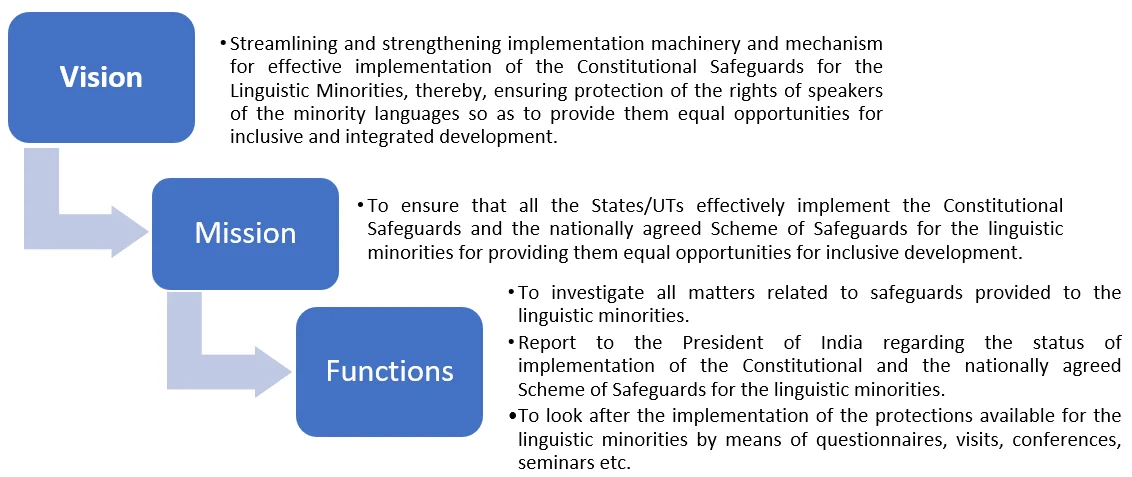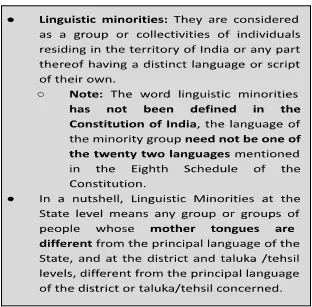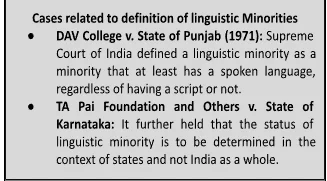India’s rich linguistic diversity, with over 120 languages, is essential to its cultural heritage. To protect this diversity and ensure equal participation for all linguistic communities, the Constitution introduced provisions for a Special Officer for Linguistic Minorities. Established in 1957, this role aims to investigate and report on the safeguards for linguistic minorities, promoting respect and awareness within society.
Enroll now for UPSC Online Course
The Role of the Special Officer for Linguistic Minorities
Constitution of Special Officer for Linguistic Minorities
- India’s Linguistic Richness: India’s linguistic richness, with over 120 languages spoken, forms the bedrock of its cultural heritage.
- Importance of Preservation: Preserving this diversity is paramount to safeguarding India’s unique identity and ensuring the equal participation of all linguistic communities.
- Promoting Multilingualism: By promoting multilingualism and fostering respect for minority languages, we can nurture a more inclusive and harmonious society where every voice is heard and valued.
- Legislative Framework: Based on the recommendations of the State Re-organisation Commission, the 7th Constitutional (Amendment) Act, 1957 was enacted, whereby Articles 350 B, entailing Special Officer for Linguistic Minorities, was added to the Constitution.
- Historical Context: It is to be noted that originally, the Indian Constitution didn’t entail any provisions regarding Special Officers for Linguistic Minorities.
Constitutional Provisions Related to Special Officers for Linguistic Minorities
- States Reorganisation Commission (SRC) 1956: The SRC recommended the creation of a mechanism to address the grievances of the Linguistic Minorities and thus to make provisions regarding the Special Officer for Linguistic Minorities.
- Article 350 B Provisions: Article 350 B in Part XVII contains the following provisions:
-
- Appointment of the Special Officer: There shall be a Special Officer for linguistic minorities to be appointed by the President.
- Duties of the Special Officer: It shall be the duty of the Special Officer to investigate all matters relating to the safeguards provided for linguistic minorities under this Constitution and report to the President upon those matters at such intervals as the President may direct.
- Reporting to the President: The President shall cause all such reports to be laid before each House of Parliament and sent to the Governments of the States concerned.
About Special Officer for Linguistic Minorities
- Establishment: In accordance with the stipulations outlined in Article 350-B of the Constitution, the position of the Special Officer for Linguistic Minorities was established in 1957, with the official title of Commissioner for Linguistic Minorities.
- Headquarters and Regional Offices: The headquarters is situated in Allahabad, Uttar Pradesh, and is supported by three regional offices located in Belgaum (Karnataka), Chennai (Tamil Nadu), and Kolkata (West Bengal), each headed by an Assistant Commissioner. Additionally, he maintains communication with the State Governments and Union Territories through designated nodal officers appointed by them.
- Tenure and Service Conditions: The Constitution does not specify the qualifications, tenure, salaries and allowances, service conditions, and procedure for removal of the Special Officer for Linguistic Minorities.
- This office falls under the Ministry of Minority Affairs.
Vision , Mission and Functions of the Commission
- As per 47th report of the Commissioner for Linguistic Minorities, it’s vision, mission, and functions are as follows:

Key Objectives of the Commission
- Equal Opportunities and Platforms: The primary objective is to provide linguistic minorities with equal opportunities and platforms for their development.
- It also aims to ensure these efforts contribute to overall national integration.
- Awareness and Safeguards:The Commissioner is tasked with spreading awareness among linguistic minorities and informing them about the safeguards available to them through the Indian Constitution.
- Implementation Assurance: It is imperative for the Commissioner to ensure the effective implementation of safeguards outlined in the Indian Constitution.
- It also collaborates with states and Union Territories to ensure adherence to agreed-upon measures.
- Grievance Redressal: The Commissioner bears the responsibility for managing representations related to grievance redressal.
- It addresses concerns and issues raised by linguistic minorities, ensuring their protection and well-being.
Issues Related to Linguistic Minorities in India
- Definition: Neither the Constitution nor any piece of legislation defines linguistic minorities.
- According to the Report of the National Commission for Religious and Linguistic Minorities (NCRLM), the linguistic minority status of a community is determined by numerical inferiority, non-dominant status in a state, and possessing a distinct identity.
- The term linguistic minority must be defined properly and such a definition should then be used while framing a law to provide affirmative action based on socio-economic backwardness.

- Causes Socio-economic Backwardness: As per the report (NCRLM) exclusive adherence to a minority language is a leading factor that contributes to socio-economic backwardness.
- The Commission has suggested that there is a need to develop mechanisms and institutional structures to accommodate linguistic minorities so that they do not fall into the traps of socio-economic backwardness merely because of the language they speak.
- Vulnerability: The vulnerability of the particular language to extinction, lack of institutional support to develop, sustain, and promote a language.
- As per the UNESCO Atlas of the World’s Languages in Danger, currently 197 languages are endangered or on the way to extinction in India.
- Dominance of Majority Language: Individuals and communities learn the majority language to survive and improve their socio-economic status.
- However, available affirmative action can only be effectively utilised by the students of indigenous linguistic minorities if their medium of instruction is their own language and English/majority regional language is taught comprehensively as a second language.

Safeguard to Linguistic Minorities
The safeguards for linguistic minorities derive their authority from two sources:
- The Constitution of India:
-
-
- Article 29: Any section of the citizens residing in the territory of India or any part thereof having a distinct language, script, or culture of its own shall have the right to conserve the same.
- Article 30: All minorities, whether based on religion or language, shall have the right to establish and administer educational institutions of their choice.
- Article 347: On a demand being made on that behalf, the President may, if he is satisfied that a substantial proportion of the population of a State desires the use of any language spoken by them to be recognized by that State, direct that such language shall also be officially recognized throughout that state or any part thereof for such purpose as he may specify.
- Article 350: Every person shall be entitled to submit a representation for the redress of any grievance to any officer or authority of the Union or a State in any of the languages used in the Union or in the State, as the case may be.
- Article 350 A: It shall be the endeavour of every State and every local authority within the State to provide adequate facilities for instruction in the mother tongue at the primary stage of education to children belonging to linguistic minority groups, and the President may issue such directions to any State as he considers necessary or proper for securing the provision of such facilities.
- Article 350 B: There shall be a Special Officer for linguistic minorities to be appointed by the President to investigate all matters relating to the safeguards provided for linguistic minorities under this Constitution and report to the President.
- Ministry of Minority Affairs, Government of India, “Scheme of Consensual Safeguards for Linguistic Minorities” (2023):
-
- Translation and Publication in Minority Languages: Provision for the translation and publication of rules, regulations, notices, etc., in minority languages in areas where their speakers constitute 15% or more of the local population.
- Declaration of Minority Languages as Second Official Language: Declaration of minority languages as a second official language in districts where their speakers constitute 60% or more of the population.
- Instruction in Mother Tongue at the Primary Stage: Provision for instruction through the mother tongue at the primary stage of education.
- Instruction in Minority Languages at the Secondary Stage: Provision for instruction through minority languages at the secondary stage of education.
- Responsibility for Safeguarding Linguistic Minorities: The basic responsibility for safeguarding linguistic minorities lies with the State Governments and Union Territory (UT) Administrations, which are required to appoint nodal officers for linguistic minorities.
-
- Their active cooperation is essential for protecting the interests of linguistic minorities.
Enroll now for UPSC Online Course
| Must Read | |
| Current Affairs | Editorial Analysis |
| Upsc Notes | Upsc Blogs |
| NCERT Notes | Free Main Answer Writing |
Conclusion
The Special Officer for Linguistic Minorities plays a vital role in safeguarding the rights of linguistic communities in India.
- By addressing grievances, promoting awareness, and ensuring the implementation of constitutional safeguards, this position fosters a more inclusive society.
- It is essential for government bodies to actively support these efforts to preserve linguistic diversity and promote national integration.
Sign up for the PWOnlyIAS Online Course by Physics Wallah and start your journey to IAS success today!
| Related Articles | |
| Special Officer for Linguistic Minorities (Article 350B) – Functions & Objectives | Houses of Parliament |
| Preamble Of The Indian Constitution | Union Territories |

 GS Foundation
GS Foundation Optional Course
Optional Course Combo Courses
Combo Courses Degree Program
Degree Program









